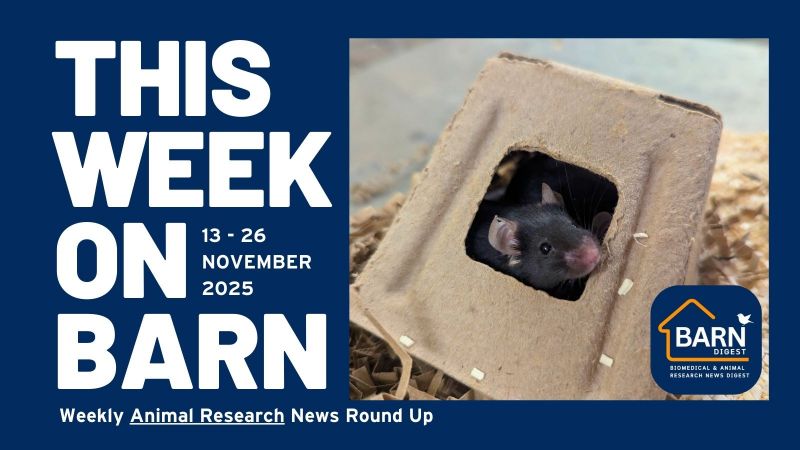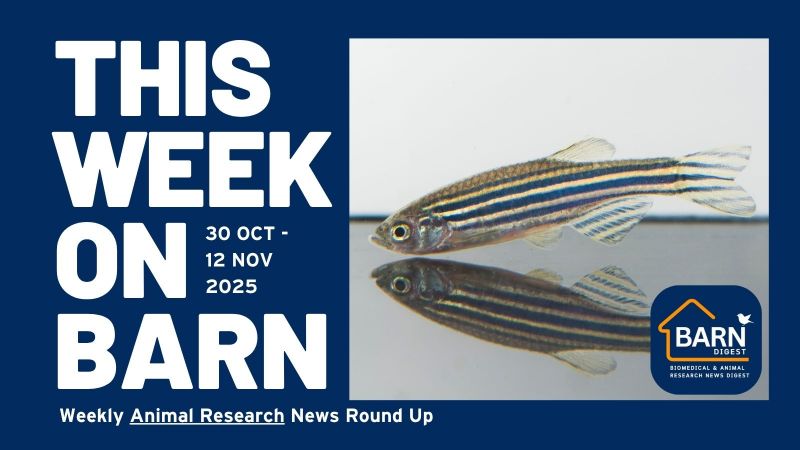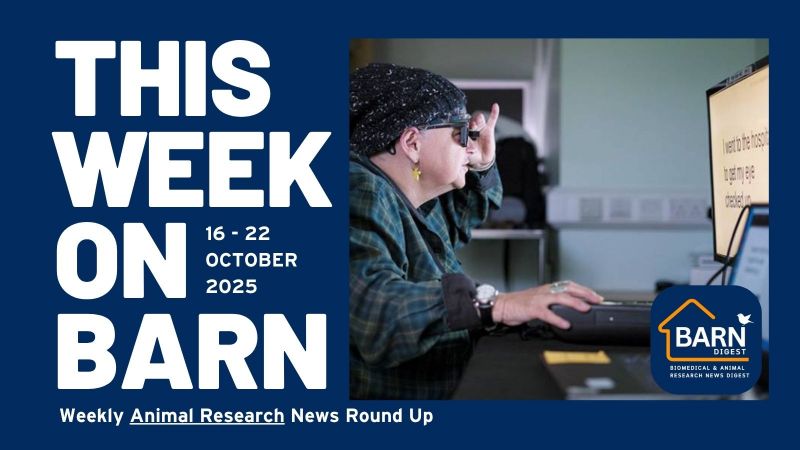
 The Biomedical Animal Research News (BARN) Digest collates animal research news from UAR’s 150+ member organisations into one, easy to access, feed. These animal research related stories include topics such as: medical studies and advancements; animal welfare and 3Rs news; funding, regulatory, and policy news; and conservation and environmental research that involves animal testing.
The Biomedical Animal Research News (BARN) Digest collates animal research news from UAR’s 150+ member organisations into one, easy to access, feed. These animal research related stories include topics such as: medical studies and advancements; animal welfare and 3Rs news; funding, regulatory, and policy news; and conservation and environmental research that involves animal testing.
Each week, we pick the most interesting, groundbreaking, and important news to feature in a weekly news roundup. In this round up we feature news stories from 14 - 21 May 2025.
View BARN to see daily news updates from UAR members.
BASIC RESEARCH
Maintaining balance in the immune system
BABRAHAM INSTITUTE | MICE
"Researchers from the Turner lab have published the first description of the role of the ZFP36 family of RNA binding proteins in regulatory T cells (Tregs). Tregs are key to maintaining balance in the immune system and essential to preventing autoimmune disease. By the targeted deletion of Zfp36l1 and Zfp36l2 in Tregs in mice, the findings demonstrate that loss of these RNA binding proteins results in Tregs no longer being able to control other immune cell types, which results in inflammation."
https://www.babraham.ac.uk/news/2025/05/maintaining-balance-immune-system
How the brain forms habits with dual learning system
UCL | MICE
"The brain uses a dual system for learning through trial and error, according to a new study in mice led by UCL researchers. This is the first time a second learning system has been identified, which could help explain how habits are formed, and provide a scientific basis for new strategies to address conditions related to habitual learning, such as addictions and compulsions."
https://www.ucl.ac.uk/news/2025/may/how-brain-forms-habits-dual-learning-system
DRUG DEVELOPMENT
Endometriosis: daily pill to manage symptoms will soon be available on the NHS – here’s how linzagolix works
UNIVERSITY OF LIVERPOOL | DEVELOPED USING ANIMALS
"A daily pill to treat endometriosis has just been recommended by the National Institute for Health and Care Excellence (Nice). Once available on the NHS, linzagolix will provide a new treatment option for those who have been unable to manage the condition using other standard treatments."
Potential new treatment to tackle commonest form of childhood cancer
UNIVERSITY OF CAMBRIDGE | MICE, HUMANS
"A combination of two drugs could improve outcomes and reduce the need for toxic chemotherapy for B-cell acute lymphoblastic leukaemia (B-ALL), the commonest cancer in childhood and one that can be particularly difficult to treat in older patients. The researchers used a new drug called inobrodib, developed by CellCentric, a University of Cambridge spinout company, to switch off CREBBP in human and mouse models of B-ALL. Combining it with venetoclax potently killed early-stage B-cells, even those cells that carried a genetic mutation making them resistant to venetoclax treatment alone."
https://www.cam.ac.uk/stories/B-ALL-new-treatment
New MenB vaccine shows promise in early-stage trial results
UNIVERSITY OF SURREY | BASED ON COVID VACCINE DEVELOPED IN ANIMALS
"A baby boy born with a rare genetic condition called CPS1 that triggers a toxic and eventually lethal level of ammonia to build up in the blood is alive today thanks to an astonishing treatment developed by specialists at Children's Hospital of Philadelphia and the University of Pennsylvania's Perelman School of Medicine."
https://www.criver.com/eureka/infant-treated-first-ever-personalized-gene-therapy-treatment
Infant Treated with First-Ever Personalized Gene Therapy Treatment
CHARLES RIVER EUREKA BLOG | DEVELOPED USING ANIMALS
"A baby boy born with a rare genetic condition called CPS1 that triggers a toxic and eventually lethal level of ammonia to build up in the blood is alive today thanks to an astonishing treatment developed by specialists at Children's Hospital of Philadelphia and the University of Pennsylvania's Perelman School of Medicine."
https://www.criver.com/eureka/infant-treated-first-ever-personalized-gene-therapy-treatment
Visit BARN for daily news updates
Last edited: 21 May 2025 15:27



